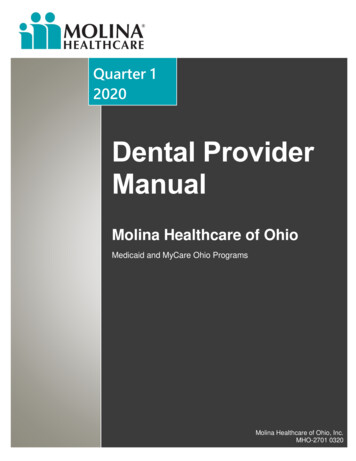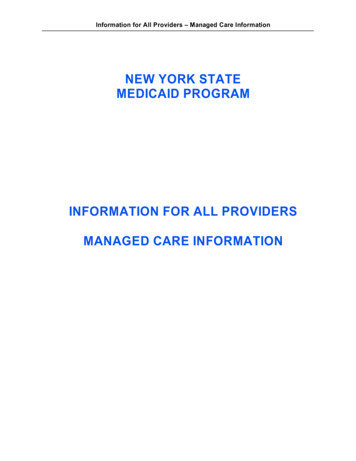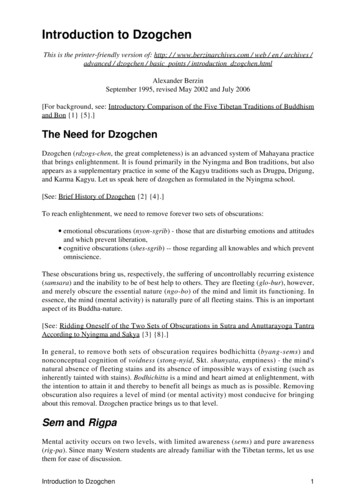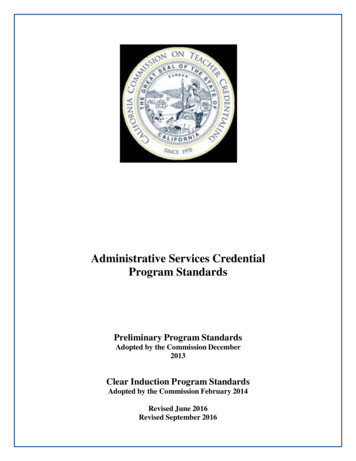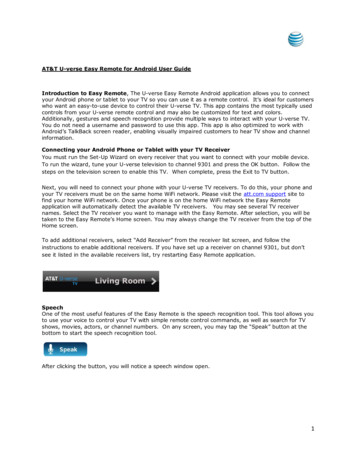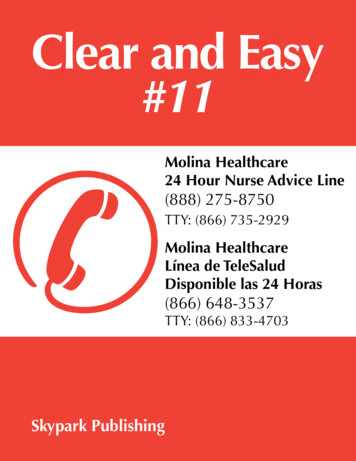
Transcription
Clear and Easy#11Molina Healthcare24 Hour Nurse Advice Line(888) 275-8750TTY: (866) 735-2929Molina HealthcareLínea de TeleSaludDisponible las 24 Horas(866) 648-3537TTY: (866) 833-4703Skypark Publishing
Titles by Clear and EasyBook 1 – PregnancyBook 2 – DiabetesBook 3 – Stress and DepressionBook 4 – End Stage Renal Disease (ESRD)Book 5 – AsthmaBook 6 – Chronic Obstructive PulmonaryDisease (COPD)Book 7 – Congestive Heart FailureBook 8 – HypertensionBook 9 – Coronary Heart DiseaseBook 10 – How to Take Care of Your SickFamilyBook 11 – Help to Quit SmokingBook 12 – Kids and AsthmaBook 13 – Kids and DiabetesBook 14 – How to Keep Your Family HealthyBook 15 – Asthma and COPDBook 16 – Hypertension and Coronary HeartDiseaseBook 17 – Postpartum: Caring for You andYour Newborn
Do you have health questions? Call MolinaHealthcare’s Nurse Advice Line. Places to put ournumber: On all your home phones. Your cell phone. Add us to your list of contacts. Your purse or wallet. Refrigerator door. Bedroom nightstand. In your medicine cabinet. In easy to reach places.Molina HealthcareNurse Advice Line(888) 275-8750TTY: (866) 735-2929Molina HealthcareNurse Advice Line(888) 275-8750TTY: (866) 735-2929Molina HealthcareNurse Advice Line(888) 275-8750TTY: (866) 735-2929Molina HealthcareNurse Advice Line(888) 275-8750TTY: (866) 735-2929Molina HealthcareNurse Advice Line(888) 275-8750TTY: (866) 735-2929Molina HealthcareNurse Advice Line(888) 275-8750TTY: (866) 735-2929NM Members:Molina Healthcare services are funded in partunder contract with the State of New Mexico.
1Clear and EasyBook 11 – Help to Quit SmokingImportant Phone NumbersProvider:Provider:Family:Neighbor:
2Molina Healthcare offers programs tohelp members stay healthy. These healthand wellness programs are at no costto you. They are part of your benefits.Programs include: AsthmaChronic Obstructive PulmonaryDisease (COPD)DiabetesHeart HealthPregnancy SupportStop SmokingMolina Healthcare uses different waysto identify members for these programs.These include information from claims,pharmacy or other health programs.You are eligible for one or more of theseprograms. The choice is yours.
3Our providers, nurses and other staff arehere to help you learn about your health.You can talk with them by phone to getanswers to your questions. You can alsoget more information such as a newsletteror booklet. Our staff can help you stayin touch with your health care provider.They can help you understand yourtreatment. They can also help you if youhave any problems.You are part of one of these programs. Callus if you would like more services. Yourhealth care provider can call us too. Thenumber to call is (866) 891-2320. You canchoose to be removed at any time. We lookforward to helping you stay in good health.If you need this booklet in another language,large print, Braille or audio format, pleasecall the Member Services number on the backof your ID card.
5Table of ContentsBook 11 – Help to Quit SmokingIntroduction.6Reasons to Quit.8Why Is Quitting So Hard?.13Preparing to Quit.18The Quit Day.21Problem Solving.23Support.24Resources.26
6IntroductionYou and your provider can work togetherto help you be as healthy as you can be.This booklet gives you some quick tipsabout how to stop smoking. You shouldnot use this booklet in place of what yourhealth care provider tells you. If you haveproblems with your health, be sure to seeyour health care provider for treatment.You may have someone who helps youwith your health care. You must givepermission to your providers or casemanagers to talk to this person aboutyour care.
7This booklet is tohelp you. It doesnot take the placeof your provider’scare. If you oryour family hasan emergency,you should callyour provider. Or,go to the nearestemergency room.
8Reasons to QuitQuitting smoking ishard, but you can doit! There are a lot ofgood reasons to quitsmoking. It is betterfor your health,your family andyour wallet to quitsmoking.Decide the top reasons you want to quit.Write them down and put them whereyou will see them often. You can put themon your bathroom mirror. Carry them inyour wallet.When you feel like you need moremotivation to quit, look at your list againand remember your reasons to for quitting.
9Your HealthYour health is affected by smoking.Smoking can cause many diseases in thebody. It can make some diseases worse.Smoking changes the way you look andsmell. Lifelong breathing problems. Lifelong heart problems. Lung, tongue, throat and othercancers. Hardening and narrowing of thearteries. This can cause strokes orheart attacks.Reasons to QuitSmoking can cause:
10Smoking makes these problems worse: Asthma High blood pressure. High cholesterol. Gum disease that can make teeth fallout.Your FamilyYour family will be healthier if you stopsmoking. Secondhand smoke is thesmoke in the air while someone else issmoking. It is dangerous for family andfriends. It can cause cancer and problemswith their lungs. It is especially harmfulfor children and pregnant women.
11Pregnant women who are aroundsecondhand smoke are more likely togive birth to premature babies.Other adults in the house have a higherrisk of lung and other cancers.Reasons to QuitChildren whoare aroundsecondhandsmoke canhave lots ofproblems.They have morerisk of asthma,lung disease,ear infectionsand allergies.
12Your WalletSmoking is expensive. The average packof cigarettes costs about 5.If you smoke a half pack a day, you spendabout 75 a month on cigarettes.In a year, you could save almost 1000dollars if you stop smoking.Another cost of smoking is the costof health care. Smoking causes moreproblems in your body as you get older.You might have to spend more moneyon medicine. You may need to see yourhealth care provider more often.Quitting now will save you a lot of moneythat you can spend on other things.
13Why Is Quitting So Hard?There are things that make quitting hardfor most people. They are: Nicotine addiction. Depending on cigarettes.The Nicotine AddictionCigarettes have nicotine in them.Nicotine is an addictive drug. It affectsparts of the brain that cause goodfeelings. Most people need to usemedicine that contains some amounts ofnicotine that can be decreased over timeto help the body quit.Be sure to take your medicines just asyour provider tells you. This is importantWhy Is Quitting So Hard? The habit of smoking.
14so you keep feeling your best. If you haveany questions, call your provider. Tellyour provider if you cannot afford yourmedicines or if you have any side effects.The Habit of SmokingQuitting can be hard because smokingbecomes a habit, and a part of yourlife. People who smoke respond to thephysical cravings. There is a ritual oflighting, holding and smoking. This ispart of a habit. There are keys to quittingthat will make quitting easier. Find newways to cope. Create new rituals. You will have thoughts and a desire tosmoke. Coping is learning to deal withit without smoking. There are two ways of coping. Changewhat you do and change how youthink.
15 You can make these changes beforegetting into a tempting situation. Thenyou won’t have as much desire tosmoke.Some ways to help you cope witheveryday situations are: Thought stopping - When you start tohave a negative or troubling thought,stop the thought and replace it with apositive thought. Distraction - Instead of smoking,try exercise, like walking or reading/watching something funny. Visualization - Imagine yourselfconquering whatever stress is in yourway.Why Is Quitting So Hard? Coping takes work. This will breaktriggers and connections to smoking.
16 Accepting the thought - Realize thatyou will have negative thoughts andthat is okay. It is important to knowthat everyone has negative thoughtssometimes. Avoidance - Sometimes you can avoida situation that causes triggers to makeyou smoke. Escape - Take a time out! If you arein a stressful situation, you can leaveor give yourself a few minutes to calmdown instead of smoking. Remindyourself, “I can handle this” and “I amin control”. Changing patterns/routines - Startnew habits or routines that supportyour new lifestyle.
17Depending on CigarettesSome smokers believe that there is aningredient in a cigarette that calmsor relaxes. It is easy to mix up thefeelings of stress with the feelings ofwithdrawal. When you experiencenicotine withdrawal, it can feel like stress,and smoking a cigarette can feel like it ishelping relieve the stress. This is not true.Instead, the cigarette is continuing to feeda nicotine addiction.Try to imagine a situation that is stressful.How would you successfully deal withthe situation without a cigarette? What ifsomeone offers you a cigarette? Practicesaying, “No thanks, I can deal with thiswithout smoking!”
18Preparing to QuitHave you tried to quit before?What things stood in your way to preventyou from quitting? What could you havedone better? Quitting is a process andpast attempts are “practice”. When youthink about what worked and what didn’twork in the past, you can figure out whatyour plan should be now.Think about what accomplishment inyour life you are most proud of. If youcan do that, you can quit smoking!You don’t want to rush into quitting.Instead, lay a strong foundation anddevelop tools for yourself so you can quitpermanently.
19Preparing to QuitIt is important to identify the issues thatmight get in your way ahead of time. Ifyou smoke when others are smoking,maybe you cango for a walkinstead and avoidthe situation.If you smokewhen you arestressed, it mighthelp to have adeep breathingexercise or otherway to deal withyour stress. Beprepared aheadof time.
20Prepare your family and friends foryour quit day. If there are other smokersin the household: Talk with thesmoker aboutwhen andwhere he orshe will smoke.Limit smokingto one room,section ofthe house oroutside. Ask the smoker to keep his or hercigarettes out of sight. Ask the smoker to use one ashtray thatis kept clean and stored when not inuse.
21 Finally, after three or four weeks, takethe housemate out for a special dinnerto thank them for helping you.The Quit DayIt is normal to feel fear or worry aboutquitting. Habits are hard to break. Don’tworry if you have not succeeded atquitting in the past. Just focus on takingthe steps you need and following theprogram of your health care provider.The Quit DayStudies have shown that picking a specificday to quit tends to work the best for mostpeople. “Gradually” or “eventually” quittingdoes not work. If you want to gradually“taper” your smoking before your quit day,that is fine. However, it is still important tohave an official day to quit.
22You must get rid of ALL cigarettes andsmoking accessories before your quitday. This includes cleaning and gettingrid of all ashtrays. It is very importantto remove ALL cigarettes from thehouse, car, purse, desk drawers, etc. Anycigarette left can be a potential problemduring your quitting process.You will start taking the smokingcessation medication prescribed by yourhealth care provider on your quit day.However, if you are taking Zyban orChantix, you will begin 7-10 days aheadof time.These medications will help with somewithdrawal symptoms of quittingsmoking. They are a very important partof the process, but are not “magic pills”
23that make you quit smoking. They do notchange how you cope or with urges andtriggers to smoking.Problem SolvingWhat happens if you slip up?Identify the things you did after your quitday that worked. What were your “wins”?Think about how many cigarettes youDID NOT smoke during this time.Identify what things did not work. Howcan you make changes so that you will besuccessful?Problem SolvingIf you slip up after your quit day, it isimportant to review your goals. Why doyou want to quit smoking? Think abouthow smoking is bad for your health andfor your family and friends.
24Schedule another quit day. You can talkto your health care provider or anothertrusted friend to help you.Quitting is hard but you can do it!SupportIdentify your supportnetwork. Tell themyou need help toquit. They can: Help yourememberto take yourmedicine. Take a walk withyou.
25 Distract you when you want acigarette.You can find a support group or websitethat can help you quit smoking. Yourhealth care provider can give you somesuggestions.It’s OK to ask for help. Talk to yourprovider, nurse or case manager.SupportTell your family and friends how you feelwhen you are quitting. Let them knowhow they can help you.
26ResourcesSmokefree.gov(800) 784-8669TTY: (800) 332-8615http://www.smokefree.gov/Centers for Disease Control and PreventionCDC/Office on Smoking and Health(800) 784-8669TTY: (800) 332-8615http://www.cdc.gov/tobacco/quit smoking/index.htmAmerican Cancer Society(800) Tobacco/GuidetoQuittingSmoking/indexMayo g/MY00433
27NotesResources
28Notes
2011 Skypark Publishing LLC
Printed in the U.S.A.27489DM0912
he Quit Day . Studies have shown that picking a speciic day to quit tends to work the best for most people. “Gradually” or “eventually” quitting does not work. If you want to gradually “taper” your smoking before your quit day, that is ine. However, it is still important to have an oicial day
